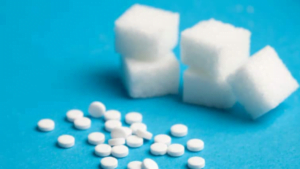What’s the recommended daily allowance for sweetener intake, and what are the consequences of exceeding it?
Tragedy in Punjab: Examining the Health Risks of Artificial Sweeteners
Recently, tragedy struck in Punjab as a 10-year-old named Manvi tragically passed away, suspectedly due to food poisoning after consuming a cake during her birthday festivities. The entire family, including her younger sister, reportedly fell ill after consuming the cake, which was ordered online from a local bakery in Patiala. According to a report by India Today, Dr. Vijay Jindal, the District Health Officer, stated that four cake samples were taken from the bakery, two of which were found to contain elevated levels of saccharin, an artificial sweetener. While saccharin is commonly used as a sugar substitute, excessive amounts can lead to gastrointestinal discomfort.
Can the presence of artificial sweeteners in food contribute to diverse health complications?
Saccharin, one of the oldest artificial sweeteners, has been used to sweeten foods and drinks for more than a century. However, its popularity as a sugar replacement didn’t surge until the 1960s and 1970s. While some believe that replacing sugar with saccharin can assist in weight loss, diabetes control, and dental care, others harbor doubts regarding the safety of all artificial sweeteners, including saccharin.

Dr. Sarbajit Ray, a Consultant Physician at ILS Hospital, Salt Lake, remarked, “Non Nutritive Sweeteners, such as Saccharin and Aspartame, are commonly used as artificial food sweeteners. While many individuals opt for sugar substitutes as a means to reduce calorie consumption, it’s important to recognize the inherent limitations of these artificial sweeteners.”
“Artificial sweeteners present various health risks, spanning from weight gain to cancer. They can be particularly harmful to individuals with Phenylketonuria (PKU). Additionally, they are associated with increased weight gain, worsening migraine symptoms, and heightened risk of heart attack and stroke. These synthetic substances are also infamous for disturbing the natural balance of gut bacteria, leading to symptoms like bloating, autoimmune disorders, intestinal wall thinning, and irritable bowel syndrome (IBS). Furthermore, they may contribute to epilepsy by reducing the threshold for seizures.”
In addition to these effects, Dr. M S Purakait, Medical Superintendent at Techno India Dama Hospital, highlighted further adverse outcomes resulting from overconsumption of artificial sweeteners.
He mentioned, “Excessive intake can result in symptoms like vomiting, stomach ache, diarrhea, fever, and fatigue, potentially leading to sudden collapse and shock. Moreover, it can have severe implications for individuals with specific genetic deficiencies. Prolonged usage of artificial sweeteners may induce insulin resistance, metabolic syndrome, and subsequent complications.”
Referring to the Punjab girl’s case, Dr. Sarbajit Ray remarked, “Given the recognized adverse effects of artificial sweeteners, the child could have been susceptible to any sudden reaction, especially if the sweetener was consumed in excess of the recommended daily limit.”
How much artificial sweetener is safe to consume daily and for whom?
Artificial sweeteners provide the sweet taste of sugar without containing any calories or carbohydrates.
Dr. Debarghya Dey, a General Physician and Diabetologist, mentioned, “Numerous studies on the safety of Non Nutritive Sweeteners (NNS) indicate that individuals over the age of one, including children, pregnant women, and breastfeeding mothers, can consume NNS. However, individuals with phenylketonuria (PKU) should refrain from consuming aspartame.”
Recommended daily allowance for sweetener
“Average daily intake (ADI) is a projection of the quantity of a food additive that can be consumed throughout a lifetime without posing significant health risks. For Aspartame, this limit is 40 mg/kg/day, while for Sucralose, it’s 15mg/kg/day. However, there is a need for extensive scientific research and evaluation concerning Non Nutritive Sweeteners (NNS) to comprehensively understand individual data and the potential risks associated with conditions like cerebrovascular disease, cardiovascular disease, and cancer,” he elaborated.
[Disclaimer: The information shared in the article, including medical advice from experts, is meant for general informational purposes only. It does not replace professional medical guidance, diagnosis, or treatment. Always consult your physician or a qualified healthcare provider for any medical concerns or questions you may have.]
Also read: Cardiac Arrest Risk for Diabetic Patients: Strategies for Heart Health


1 thought on “What’s the recommended daily allowance for sweetener intake, and what are the consequences of exceeding it?”